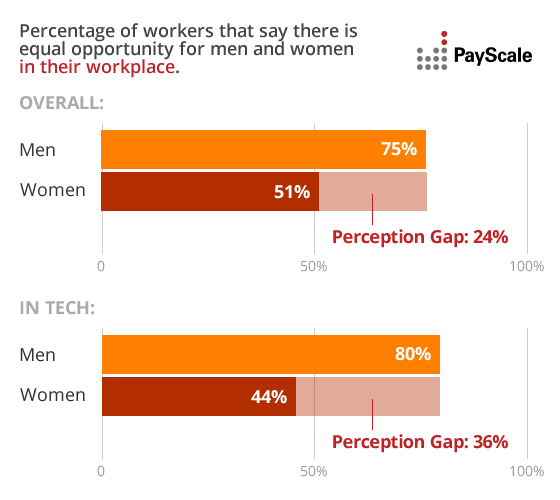
Exceptionalism — the idea that as an individual or society we’re separate (and better) than our peers — is a core tenant of American ideology. It also makes closing the gender gap in tech more difficult.
Compensation data firm PayScale surveyed 140,000 employees and found that when it comes to dealing with gender discrimination, many have trouble even recognizing that there’s a problem. Sixty-six percent of male tech workers interviewed said men and women have equal opportunities in most workplaces. Only 30 percent of female employees agreed.

More employees, both male and female, believe that inequality isn’t an issue within their own companies. Eighty percent of male tech workers and 44 percent of female tech workers said there are equal opportunities for men and women in their workplaces. PayScale found these trends in participants who don’t work in tech as well, but the gaps were smaller.
“If this data highlights anything, it is that men need to step up to the plate,” Matt Wallaert, behavioral scientist and creator of GetRaised.com, said in a press release. “We benefit from the system of inequity, we hold a position of privilege, and far too many of us are blind to the fact that this is a problem that occurs within our sphere of control. Only 25 percent believe it is a problem in their workplace? That’s a devastating finding.”
Wallaert references the finding that 75 percent of male employees, overall — versus 80 percent of male tech employees — believe men and women have equal opportunities in their workplace.
Whether or not it is perceived, research shows women don’t earn as much, or receive promotions as frequently, as their male counterparts. This means employees, particularly men, are perceiving themselves and their workplaces as exceptional to the broader trend of gender bias. This phenomenon of overestimating oneself is sometimes referred to as the “Lake Wobegon Effect.”
Lake Wobegon is a town, fictionalized by radio personality, Garrison Keillor, where “all the women are strong, all the men are good-looking, and all the children are above average.”
The Lake Wobegon Effect happens all the time, but some research suggests that inequality causes it to be more prevalent. In a study published by Psychology Today, researchers found that individuals in societies with greater income inequality were more likely to self-enhance, or view themselves as better than others.
Steve Loughnan, the scholar behind the study, suspects that competition may be at the heart of this correlation. If there is an unequal distribution of wealth and people are competing for a small number of high-paying jobs, they are more likely to self-aggrandize in order to stand out, he argues. If competition really is the driving factor for this Wobegon Effect we’re seeing in the workplace, it’s unsurprising that the tech industry suffers most greatly.




